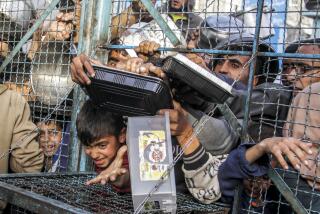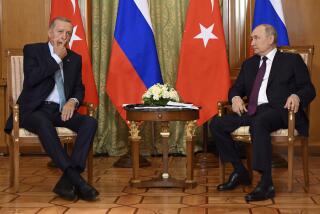Soviets to Buy $1 Billion in Food From Abroad : Hunger: Gorbachev hopes to restock shelves, squelch the black market and quell fears of winter shortages.
- Share via
MOSCOW — Soviet President Mikhail S. Gorbachev, disclosing the highlights of an emergency plan to get his shortage-plagued country through the winter, said Tuesday that more than $1 billion in food must be purchased abroad in the next four months to make up for shortfalls in domestic production.
In a speech to the Soviet legislature, Gorbachev said a task force he created is working virtually around the clock to devise “urgent measures” to alleviate deficits in state-run Soviet grocery stores and ensure a reliable supply nationwide.
“The work is at its final stage,” Gorbachev assured the lawmakers. “Today, or tomorrow at the most, a draft program of action will be finished.” It will then be discussed with the governments of the constituent Soviet republics, he said.
By all accounts, food supplies to the largest cities of the Soviet Union are their worst since World War II and the immediate postwar period, and consumers have been further depleting the shops through spates of panic buying and stockpiling, fueling widespread fears of a possible famine.
Clearly intending to debunk such talk, but acknowledging that the food issue is the “most urgent question” now facing the Kremlin leadership, Gorbachev said that it is in the power of the government, through urgent measures he will recommend, to provide as much grain, eggs, cooking oil and other basic foodstuffs per citizen as in 1989.
The plan being drawn up includes the following measures to see the country through the winter and revitalize its agriculture on a longer-term basis, according to Gorbachev:
* To feed the Soviet Union through March, foodstuffs worth a total of 2.1 billion rubles, or $1.28 billion at the newly introduced official commercial exchange rate, must be bought abroad.
* To increase domestic agricultural production, a total of 3 million to 5 million hectares, or 7.4 million to 12.3 million acres, should be given to city dwellers and peasants alike so they can plant gardens. Such small-scale holdings, allowed in the Soviet Union even in times of great socialist rigor, are the nation’s most productive farmland by far.
* Construction and modernization of food processing plants, traditionally one of the weakest links in the Soviet food chain, will be stepped up.
* Black marketeers and “speculators” will be tracked down and punished, in part through the strict supervision of stores and plants by workers committees ordered by Gorbachev last Friday. Raids on 50 Moscow shops found that when they close, “a third shift begins,” Gorbachev said, meaning that after hours, workers are dealing in foodstuffs for their own profit.
“Within the next two or three weeks, we think we can control the situation,” Gorbachev said of the black market, which by many estimates siphons off half the grocery shipments designated for state-run shops and has become a common, if expensive, source of supply for Soviet consumers.
Some foreign countries, showing their support for Gorbachev’s perestroika program for social and economic restructuring, are now shipping food aid to the Soviet Union. The United States, which had originally opposed such assistance as unnecessary or ineffective, is reviewing its policy.
As his domestic troubles have multiplied, Gorbachev has won long-term, low-interest credits from some Western European countries to finance foreign food purchases, which he said Tuesday would pay at least part of this winter’s bill.
“Either the appropriate contracts have been signed and supplies are under way, or the questions have been thoroughly studied,” Gorbachev said. But he said total needs for 1991, and apparently the cost of food imports for the year as well, have not been established.
Members of the Supreme Soviet received most of Gorbachev’s proposals in silence or with an audible buzz of skepticism--for example, when he spoke of creating a Ministry of Agriculture, which would be the latest bureaucratic organ to oversee the chronically unproductive collective and state farms.
Some radical approaches were vaguely hinted at. Gorbachev tantalizingly said the plan includes measures to alter “land relations”--but they appeared to consist largely of traditional remedies for Soviet agricultural problems.
In contrast, the more unorthodox Parliament of the Russian Federation on Monday approved private ownership of land--not just gardens, but parcels of farmland--in hopes of fostering an army of peasant entrepreneurs to feed Russia.
Gorbachev went to the Supreme Soviet to seek approval for his scheme to restructure the government, a change that would put him in direct charge of a cabinet-style executive branch. Gorbachev is pressing for revision of the apparatus of Soviet power at the same time that he is seeking a new, looser Soviet federation.
Recent actions by Gorbachev have led progressive and radical lawmakers to fear that in the face of economic woes, ethnic crises and virtual deadlock of the political system, Gorbachev is backtracking in his reforms or even throwing in his lot with the KGB, Soviet army, Communist Party apparatus and other conservative institutions.
One prominent progressive, Alexei M. Yemelyanov, denounced Gorbachev’s governmental reorganization plan in the legislature as a “big step leading to the limitation of the power of the Supreme Soviet,” since it would minimize legislative control over government ministries.
Nevertheless, a majority of the lawmakers approved Gorbachev’s proposal in principle and sent it to the larger Congress of People’s Deputies, which alone can make the necessary constitutional amendments, for final approval later this month.
More to Read
Sign up for Essential California
The most important California stories and recommendations in your inbox every morning.
You may occasionally receive promotional content from the Los Angeles Times.












